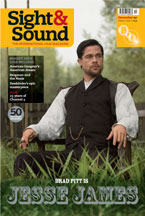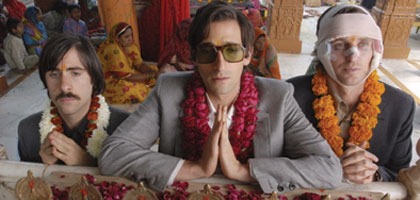Primary navigation

USA 2007

Reviewed by Ryan Gilbey
Our synopses give away the plot in full, including surprise twists.
Paris, the present. In a prologue, Hotel Chevalier, Jack Whitman is visited by his ex-girlfriend at the hotel where he has been staying for some months. They have sex. In The Darjeeling Limited, Jack and his older brothers Francis (who has recently survived a deliberate motorcycle crash) and Peter take a train journey across India. It is the first time they have seen one another since their father's funeral a year earlier. Francis reveals that he has made contact with their mother - who didn't attend the funeral and is now in a convent in the foothills of the Himalayas - and that they are going to visit her. When a fight breaks out over Peter hoarding their father's possessions and Jack lets off a can of pepper spray, the brothers are thrown off the train. Walking by a river, they try to save three boys who have fallen in, but one child is killed on the rocks. They return his body to his village, and stay for the funeral. The film flashes back to an incident on the day of their father's funeral, when Peter tried to retrieve their father's car from the garage where it was being repaired. The Whitmans abandon their plan to leave India and press on, even though their mother has written asking them not to come. They meet with her at the convent, but in the morning she vanishes. The brothers catch their train, casting off the luggage that has been weighing them down throughout the trip.
Watching Wes Anderson's most recent work, you would be forgiven for thinking that the control-freak heroes of his delightful early features, Bottle Rocket (1995) and Rushmore (1998), were actually scathing self-portraits rather than inspired comic creations. There was no shortage of eccentricity in The Royal Tenenbaums (2001) and The Life Aquatic with Steve Zissou (2004), but it was of the most studied kind, played out according to a strict menu of themes, camera movements and absurdist character traits. Watching these films was like being suffocated slowly and lovingly by the cartoonist Gary Larson.
The opening moments of The Darjeeling Limited inspire cautious optimism in anyone still holding out for Anderson to recapture his initial zest. This new picture comes with a self-contained 13-minute prologue, Hotel Chevalier, in which young Jack Whitman receives his ex-girlfriend in a Paris hotel room production-designed to within an inch of its life. When the film proper begins, announcing our arrival in the Indian city of Jodhpur with a burst of the antsy title music from Satyajit Ray's Jalsaghar, and the kind of ungainly, long-lens zoom outlawed since the early 1970s, the culture shock is immediate and encouraging. A businessman, played by Anderson regular Bill Murray, is left on the platform while his train, and the movie, depart without him; the hopeful viewer will infer from this that the director is leaving behind his familiar formula, as represented by Hotel Chevalier and Murray, and heading for pastures new.
Such conjecture is premature. Anderson may have acquired two new co-writers (Roman Coppola and Jason Schwartzman, who plays Jack) and relocated to the Indian subcontinent. And the usual pop songs are now outnumbered by musical excerpts from films by Ray (Teen Kanya, Charulata) and Merchant Ivory (Shakespeare Wallah, Bombay Talkie) that mark out The Darjeeling Limited as a movie about movies about India. But in film-making terms, he's too busy with his nose in a guidebook to go sightseeing. The main characters - Jack and his brothers Francis (Owen Wilson) and Peter (Adrien Brody), travelling across India after a year's estrangement - imitate Indian customs and spout blandishments such as, "I love the way this country smells - kinda spicy." It's difficult, though, to see how Anderson's film is any less superficial in its appraisal of India.
Much is made of the idea of borrowing and appropriation, from that patchwork soundtrack to the belt that Francis gives to Peter as a gift, and then snatches back, three times in the course of the picture. But Anderson is guilty too of taking from India those elements that serve his own format, when he might instead have differentiated between the Whitmans' blinkered perspective and his own. Jack enjoys a fling with Rita, the train's stewardess, which conforms so rigidly to the specifications of Anthony's romance with the Mexican Inez in Bottle Rocket (brief, exotic, twee) that it could be the same script with the names changed. There is a rare brush with raw emotion when the brothers fail to save an Indian child who falls in a river. But all is not lost. The boy's funeral becomes the catalyst for a flashback to the day their own father was buried, so it's nice that something structurally useful could come out of that arbitrary death.
The Darjeeling Limited isn't just complacent, though it is that: the stock elements employed by Anderson for more than a decade - slow-motion shots set to 1960s British pop, former writing partner Owen Wilson as a melancholy loser, robotic tracking shots that glide sideways for comic effect, excitable whip-pans - have never felt less inspired, or more like a safety-net. But the recurring image of the Whitmans hauling their luggage through deserts and far-flung villages feels hypocritical. The joke is that these decorative bags - tan suitcases designed by Marc Jacobs for Louis Vuitton, and so tenderly photographed that they should have been billed above the title - only hinder the brothers, just as their grudges impede their spiritual progress. In the final shot before the end credits, the characters accept as much, symbolically shedding their baggage, emotional and physical, as they sprint for the train ("The past is over," their mother has told them).
How strange that Anderson has failed to heed his own message. In making yet another film about dysfunctional families with dead or unreliable parents (as in everything since Rushmore) and competitive, independently wealthy siblings (The Royal Tenenbaums), without showing the most modest advance as either a comic stylist or a dramatist, Anderson is evidently encumbered by his own cargo. Louis Vuitton it may be, but the overriding sensation here suggests the endless revolutions of a baggage carousel.